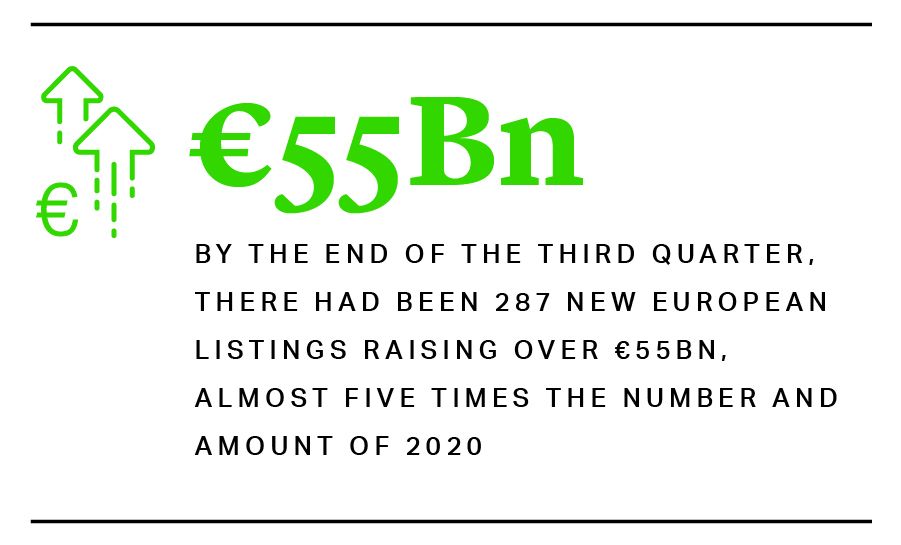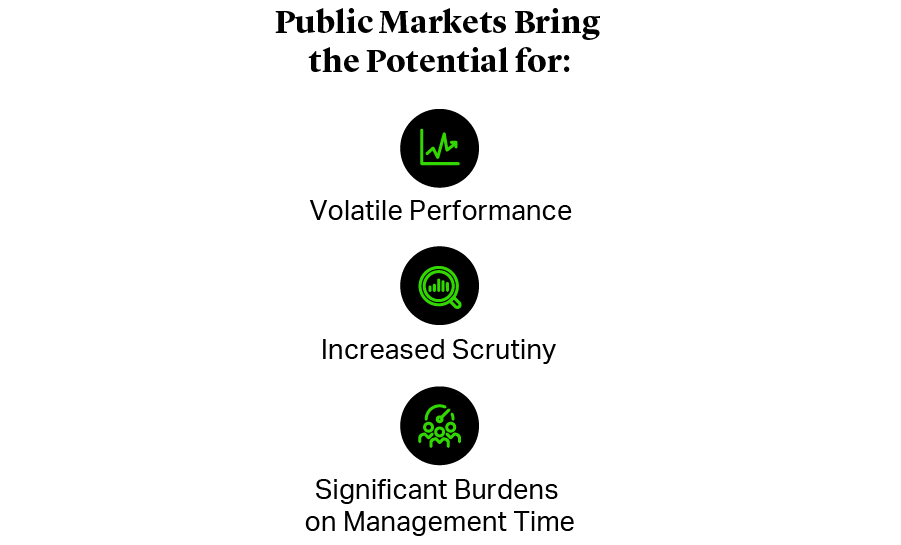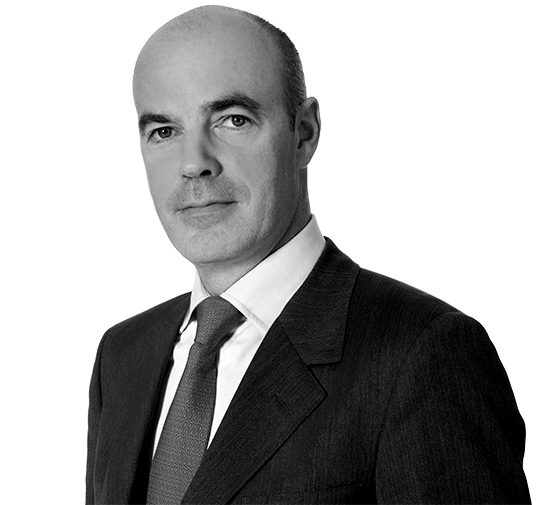IPOs Versus Staying
Private: Weighing the
Benefits for Private Equity

2021 represented a banner year for European private equity and venture capital-backed initial public offerings. By the end of the third quarter, there had been 287 new European listings raising over €55bn, almost five times the number and amount of 2020, according to PwC's IPO Watch1.

The explosion in the number of European start-ups valued at over $1bn is fuelling expectations that 2022 will be another very strong year for IPOs. Venture data tracker Crunchbase estimates that 84 new unicorns were created in 2021 in Europe, compared with just 11 in 2020, taking the current total to 150 unicorns that remain private2. Some ambitious start-ups and platforms are even positioning themselves early, by implementing public company-style governance, accounting and controls, arrangements, and processes, in preparation for life on public markets.
Yet, while IPOs can clearly serve as a lucrative exit route for owners, public markets remain volatile and still have the potential to disappoint – as evidenced by a number of high-profile IPOs during 2021 on both sides of the Atlantic suffering from volatile post-IPO trading. Coupled with this potential uncertainty over the ultimate value of an exit through an IPO, high levels of dry powder in the hands of fellow private equity and venture capital firms, as well as sovereign investment firms, mean that large private companies have other options.

Continental Exchanges Challenge London’s Lead
London remains the premier listing destination in Europe but has seen its lead narrow following Brexit. UK IPOs raised some $22bn in 2021, according to Bloomberg3, as it retained some larger listings, while Stockholm IPOs brought in $14bn and Amsterdam IPOs raised $12.5bn.
Continental European exchanges, notably Amsterdam and Frankfurt, were quicker to embrace SPACs and benefitted from greater exposure to the trend. While London has now eased rules for blank-cheque vehicles, some continue to favour Europe. In January, British businessman Richard Branson was reported to be drawing up plans for Euronext Amsterdam-listed SPAC to raise capital and hunt for acquisition targets4. Amsterdam also allows companies to publish prospectuses and other listing documents in English, enabling it to target British and international companies that might have otherwise chosen London.
The mixed performance of some of the UK’s highest-profile IPOs has also cast a shadow over London’s listing venues. Food delivery group Deliveroo saw its share price slump by 26%5 on its opening day in March 2021 and, as of mid-January, continues to trade 50% below its listing price. Other high-profile listings, such as THG, have also deteriorated and continue to trade significantly below their IPO prices. In contrast, funds platform Allfunds, backed by Hellman & Friedman and GIC (together with BNP Paribas and Credit Suisse) has seen its share price rise by some 36% since its debut in Amsterdam in April last year.
IPO Exits Become Cleaner and Quicker?
In companies exhibiting smooth performance post-IPO, private equity firms are now finding it easier and quicker to fully exit their stakes via IPO than has historically been the case. This is because underwriters have been regularly prepared to waive lock-up periods, enabling sponsors to undertake significant secondary sell-down transactions earlier and more frequently than they have historically been able to.
In June last year, banks waived the 180-day lock-up period for German online car seller AUTO1, enabling pre-IPO investors to sell another stake in the business that they listed four months earlier at the start of February6. Such practices have been controversial but can be popular with new investors wanting to enter the business or raise their stakes.

Private Companies See Merits in Staying Private for Longer
Public listings may be more welcoming than in the past, but many start-ups and private equity-backed companies remain reticent about giving up their private status too soon. Public markets bring the potential for volatile performance, as well as increased scrutiny and significant burdens on management time.

In addition, public market demand for new companies is matched by increased appetite among large investors for private investments. Historically control-orientated private equity firms are increasingly willing to invest as minority shareholders in large venture-backed start-ups in Europe, meaning those companies can stay private for much longer. Permira invested in Swedish fintech Klarna in 2017 at a $2.5bn valuation7, followed by Silver Lake in 2020 at a valuation of $10.6bn8. A subsequent Softbank-led funding round valued the business at almost $46bn9, making it Europe’s largest privately backed start-up.
In addition to buyout firms, sovereign investment funds continue to increase their presence in the space. Singapore’s GIC has been one of the most active on this front, investing in funding rounds totalling $5.6bn in Europe in 2021, almost a three-fold increase on 202010.
Staying private for longer brings its own complexities, however, as early-stage investors and founders delay seeking the liquidity of public markets and today later-stage funding rounds commonly include relatively large secondary components that provide some liquidity for early backers (although commonly at a discount).



Michael J. Preston
Partner
London
T: +44 20 7614 2255
mpreston@cgsh.com
V-Card
Gabriele Antonazzo
Partner
London
T: +44 20 7614 2353
gantonazzo@cgsh.com
V-Card
Michael James
Partner
United Kingdom
UK Core PE Group:
Extended Private Equity Practice:
Italy
Italian Core PE Group:
Extended Private Equity Practice:
France
French Core PE Group:
Extended Private Equity Practice:
Belgium
Belgian Core PE Group:
Extended Private Equity Practice:
Germany
German Core PE Group:
UAE































